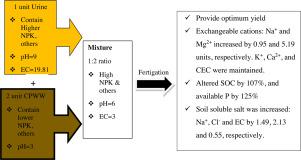Environmental Technology & Innovation ( IF 6.7 ) Pub Date : 2021-04-20 , DOI: 10.1016/j.eti.2021.101571 Yitayal Addis Alemayehu , Seyoum Leta Asfaw , Tadesse Alemu Terfie

|
Treatment and application of wastewater as a plant nutrient source is one of the waste management approaches currently used. This study attempted to investigate the effect of the application of human urine and coffee processing wastewater (UCPWW) on selected soil characteristics and compared it with rainwater and synthetic fertilizer in a completely randomized design. One-way analysis of variance (ANOVA) for difference and principal component analysis for correlation was employed. It was found that the soil organic carbon (SOC) and available phosphorus after production in a 1:2 ratio of UCPWW was significantly varied from the values before production and the soil treated with synthetic fertilizer (F=24.01, p=0.001; F=49.03, p=0.001, respectively). No significant difference was observed on micro-nutrients and the cation exchange capacity, but on some of the exchangeable cations: Na(F=15.27, p=0.001) and Mg (F=12.99, p=0.001) of 1:2 ratio application. The soil salinity was significantly increased and varied from other treatments: Na (F=11.88, p=0.04), Cl(F=17.24, p=0.001), and total salinity (EC) (F=11.88, p=0.003), and significantly correlated with SOC and nutrients. The exchangeable sodium percentage (ESP), saturated electrical conductivity (EC), and pH values for single round cultivation indicated no effects of sodicity, saline-sodicity, and salinity. However, the effect for repeated applications and cultivations, and mechanism of minimizing the salinity by the substrate should be studied before large-scale application.
中文翻译:

尿液和咖啡处理废水作为营养源的再利用:最佳白菜产量对土壤特性的影响
废水作为植物营养源的处理和应用是当前使用的废物管理方法之一。这项研究试图调查人类尿液和咖啡处理废水(UCPWW)的使用对选定土壤特性的影响,并在完全随机的设计中将其与雨水和合成肥料进行比较。采用单向方差分析(ANOVA)进行差异分析,并采用主成分分析进行相关分析。发现以1:2的UCPWW比例生产后的土壤有机碳(SOC)和有效磷与生产前和合成肥料处理过的土壤有显着差异(F = 24.01,p = 0.001; F = 49.03,p = 0.001)。微量营养素和阳离子交换量没有显着差异,(F = 15.27,p = 0.001)和镁(F = 12.99,p = 0.001)以1∶2的比例施用。土壤盐度显着增加,并且与其他处理方法有所不同:Na (F = 11.88,p = 0.04),Cl(F = 17.24,p = 0.001)和总盐度(EC)(F = 11.88,p = 0.003),并且与SOC和养分含量显着相关。交换钠百分比(ESP),饱和电导率(EC),单轮培养的pH值表明碱度,盐碱度和盐度均无影响。但是,在大规模施用之前,应研究重复施用和培养的效果,以及使基质的盐度最小化的机理。










































 京公网安备 11010802027423号
京公网安备 11010802027423号